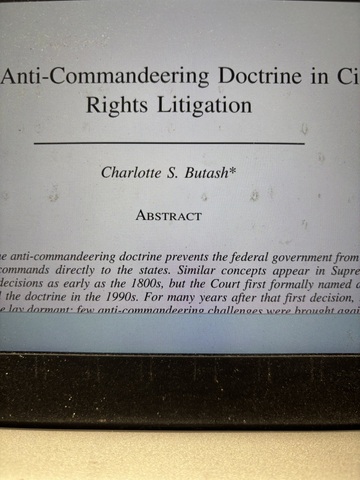
Two ideas caught my attention in this Labor Day Week 2025. One is the legal doctrine known as the anti-commandeering doctrine. The other involves the enforcement of State laws and County and Municipal Ordinances.
The anti-commandeering doctrine has been defined in a major article in the Harvard Civil Rights - Civil Liberties Law Review: "The anti-commandeering doctrine stands for the proposition that the federal government may not force state governments to carry out its will."
The anti-commandeering doctrine is generally spoken of with regard to acts of Congress, but it applies to everyone wielding the powers of the federal government. That is because the doctrine depends on the Tenth Amendment to the U.S. Constitution which reserves all powers to the States which are not expressly given to the federal government.
I will explore this doctrine in more detail in the future, but my initial thought is that it provides a legal basis for at least some of the resistance to the regime's actions. It does not, I think at first glance, provide opposition itself.
That leads conveniently and directly to the second idea that has caught my attention recently: the idea that when actions are taken in the name of the federal government in such a way that the actions allegedly violate State criminal laws or County and Municipal ordinances, the perpetrators might be subject to local law and federal law cannot protect their crimes.
This could apply to assaults, kidnapping, "unlawful restraint," obstructing justice (such as by kidnapping people at courthouses who are there for legal proceedings in the courts), and in general "acting beyond their legal authority" in which case "they can be prosecuted, assuming they commit crimes, in state court." The quotes are attributed to Larry Krasner, District Attorney of the City of Philadelphia, in a Substack article.
Whether Krasner said these things or not, is not the point. Certainly not the point for me.
Rather, the idea expressed in these quotes is the point. It sounds theoretically plausible to me: If a person, anyone, commits a crime under State law or in violation of an ordinance, they are theoretically liable to be prosecuted for those crimes. That's an interesting idea, so far as it goes.
The City of Chicago has apparently adopted an ordinance against 'law enforcement officers' wearing masks and requiring them to show ID, among other things. I have seen some commentary that Chicago has not gone far enough to make violations of the ordinance legal offenses, but for the sake of argument at the moment suppose that these ordinances are enforceable law in Chicago.
I have seen the Police at work in Philadelphia and I have seen them in Chicago. Without having any personal experience with the Police in either city, I can tell you that in my judgment, the Philadelphia Police and the Chicago Police are both fully capable of enforcing the law in their cities.
That being said, the question becomes: Will they? Will they enforce the law and arrest 'federal officers' who commit State crimes in their cities? Or who violate County or Municipal Ordinances? If not, who will enforce the law?
A version of this article was published on Substack. (You can see there photos of the sign, front and back, that I carried on Labor Day 2025.)